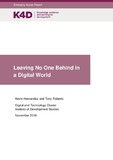| dc.contributor.author | Hernandez, Kevin | |
| dc.contributor.author | Roberts, Tony | |
| dc.date.accessioned | 2018-11-27T12:20:33Z | |
| dc.date.available | 2018-11-27T12:20:33Z | |
| dc.date.issued | 2018-11 | |
| dc.identifier.citation | Hernandez, K. and Roberts, T. (2018). Leaving No One Behind in a Digital World. K4D Emerging Issues Report. Brighton, UK: Institute of Development Studies. | en |
| dc.identifier.uri | https://opendocs.ids.ac.uk/opendocs/handle/20.500.12413/14147 | |
| dc.description | Emerging Issues Report | en |
| dc.description.abstract | In an increasingly digital world, relatively privileged people are able to use their access to mobile and internet technologies to access clear digital dividends including remote access to health and education information, financial inclusion and digital pathways to economic and political empowerment. However, already disadvantaged people have less access, agency and ability to reap these digital dividends, and are being left further and further behind. One third of the world’s population do not own a mobile phone, and 50% of the global population have no internet. A series of digital divides is adding new digital dimensions to poverty in the twentieth century. This is not a binary divide: new classes of technology access and connectivity experience are leading to a range of different digital inclusions and exclusions. These digital dimensions of poverty often reflect, reproduce and amplify gender, racial and caste/class divides. As the relatively privileged upgrade to the latest generation of smartphones and connectivity speeds, and as ever more aspects of social, economic, and political life move online, the digitally disadvantaged experience widening inequalities. Development professionals require new diagnostic tools to analyse the digital access and everyday technology practices of those being left behind in their area of work. New research is necessary to understand the development implications in this dynamic space, including the impact of artificial intelligence (AI) on governance and work automation on employment and growth. | en |
| dc.language.iso | en | en |
| dc.publisher | IDS | en |
| dc.relation.ispartofseries | K4D Emerging Issues Report; | |
| dc.rights | This report was prepared for the UK Government’s Department for International Development (DFID) and its partners in support of pro-poor programmes. It is licensed for non-commercial purposes only. K4D cannot be held responsible for errors or any consequences arising from the use of information contained in this report. Any views and opinions expressed do not necessarily reflect those of DFID, K4D or any other contributing organisation. © DFID - Crown copyright 2018. | en |
| dc.rights.uri | https://www.nationalarchives.gov.uk/doc/open-government-licence/version/3/ | en |
| dc.subject | Development Policy | en |
| dc.subject | Poverty | en |
| dc.subject | Technology | en |
| dc.subject | Work and Labour | en |
| dc.title | Leaving No One Behind in a Digital World | en |
| dc.type | Other | en |
| dc.rights.holder | © DFID – Crown Copyright | en |
| dcterms.dateAccepted | 2018-11 | |
| rioxxterms.funder | Department for International Development, UK Government | en |
| rioxxterms.identifier.project | K4D | en |
| rioxxterms.version | VoR | en |
| rioxxterms.funder.project | 238a9fa4-fe4a-4380-996b-995f33607ba0 | en |

